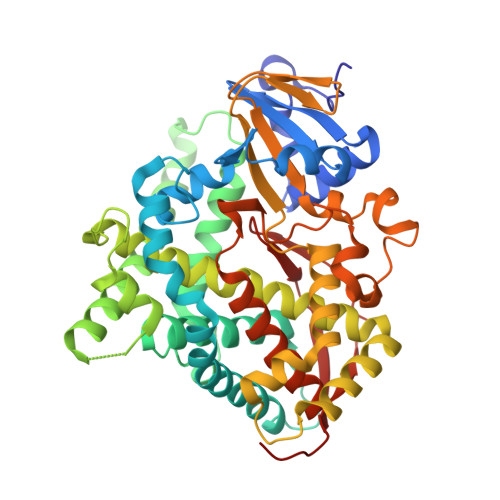Human P450-like oxidation of diverse proton pump inhibitor drugs by 'gatekeeper' mutants of flavocytochrome P450 BM3.
Butler, C.F., Peet, C., McLean, K.J., Baynham, M.T., Blankley, R.T., Fisher, K., Rigby, S.E., Leys, D., Voice, M.W., Munro, A.W.(2014) Biochem J 460: 247-259
- PubMed: 24588219
- DOI: https://doi.org/10.1042/BJ20140030
- Primary Citation of Related Structures:
4O4P - PubMed Abstract:
Production of drug metabolites is one area where enzymatic conversion has significant advantages over synthetic chemistry. These high value products are complex to synthesize, but are increasingly important in drug safety testing. The vast majority of drugs are metabolized by cytochromes P450 (P450s), with oxidative transformations usually being highly regio- and stereo-selective. The PPIs (proton pump inhibitors) are drugs that are extensively metabolized by human P450s, producing diverse metabolites dependent on the specific substrate. In the present paper we show that single mutations (A82F and F87V) in the biotechnologically important Bacillus megaterium P450 BM3 enzyme cause major alterations in its substrate selectivity such that a set of PPI molecules become good substrates in these point mutants and in the F87V/A82F double mutant. The substrate specificity switch is analysed by drug binding, enzyme kinetics and organic product analysis to confirm new activities, and X-ray crystallography provides a structural basis for the binding of esomeprazole to the F87V/A82F enzyme. These studies confirm that such 'gatekeeper' mutations in P450 BM3 produce major perturbations to its conformation and substrate selectivity, enabling novel P450 BM3 reactions typical of those performed by human P450s. Efficient transformation of several PPI drugs to human-like products by BM3 variants provides new routes to production of these metabolites.
Organizational Affiliation:
*Manchester Institute of Biotechnology, Faculty of Life Sciences, University of Manchester, 131 Princess Street, Manchester M1 7DN, U.K.
















